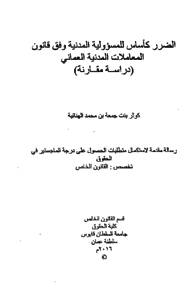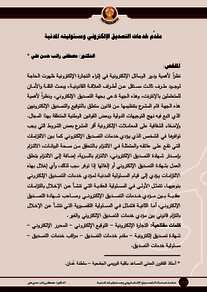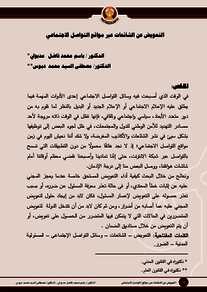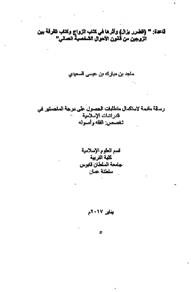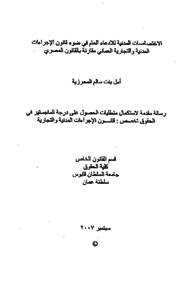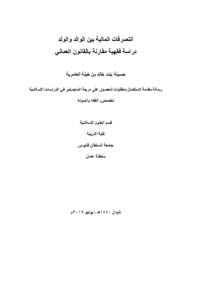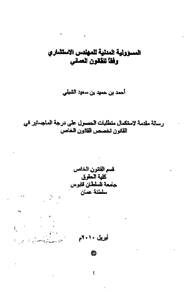Document
الضرر كأساس للمسؤولية المدنية وفق قانون المعاملات المدنية العماني : دراسة مقارنة
Publisher
جامعة السلطان قابوس
Gregorian
2016
Language
Arabic
Subject
English abstract
This dissertation is investigates (damages and harmful action: as an essential element of civil responsibility according Omani civil procedure law) by comparing it with other similar laws applied in Egypt, Jordan and United Arab Emirates. This comparison consists of: what is the harm, what type is it and what is the harm description in details. The comparison also goes further to reach how the Omani Civil Procedure Law deals with harmful actions. We are living today in time of responsibility. It is no longer acceptable to anyone to suffer from damage without pointing the finger to blame the one who cause it and ask him for compensation. The reason behind this is the person sense of his rights and his willingness to preserve them. This kind of sense was developed by the progress in civil, social and economy levels. Unfortunately, the progress has a negative side beside the positive side we have mentioned. Although modernization gives humans fast and easy equipment to use, it also produced new forms of damages that did not exist before. The legislator was obliged to follow-up with this development in order to preserve people's rights and protect them from any harm. As a result of this evolution, the traditional concept of "wrongness" as the main element of responsibility has been changed. It is now replaced by the concept of "liability". As taking "wrongness "doses not implement social justice. The beneficiary should hold responsibility for any risk that could harm people, as the beneficiary holds the liability. The study concludes in showing a great difference in the legal description of the meaning damage. For example: the legislator in Egypt applied the civil responsibility when wrongness exists. On the other hand Omani, United Arab Emirates and the Jordanian law applied the civil responsibility only when damage exists. Their principle is drawn from the Islamic sharia which stated: "There should be neither harming nor reciprocating harm". The study also includes several
findings and recommendation related to harmful actions / damages that are describe in details in the coming.
The main findings of this study include:
1-Damaging is causing any kind of harm to others. It can harm people's own rights or an interest he owns, whether this right or interest has a financial value or not.
2-The harmed dose not eligible for any compensation unless the damaged has met the main condition, which summarize in causing a damaging in a legitimate right or interest.
3-The Omani law system dose state clearly to compensate damages that have compensatory / actual damages. On the other hand, the Omani law does not state clearly of the compensation for noneconomic damages.
Description
رسالة جامعية
Member of
Resource URL
Arabic abstract
تتناول هذه الدراسة موضوع الضرر كأساس للمسؤولية المدنية على ضوء قانون المعاملات المدنية العماني ومقارنته بالوضع في القانون المصري، الأردني، والإماراتي، من خلال تناول ماهية الاضرار، أنواعه، وأوصافه، وصولا لتطبيقات الفعل الضار في قانون المعاملات المدنية العماني. ونظرا لكوننا نعيش اليوم في عصر المسؤولية، فلم يعد أحد يتقبل فكرة أن يتحمل الضرر الذي يصيبه دون أن يحمل مسؤولية هذا الضرر لشخص أخر ويطالبه بالتعويض، إذ أن المرء بدأ يستشعر حقوقه ويتمسك بها، وقد ظهر هذا الشعور نتيجة التطور الحضاري والاجتماعي والاقتصادي، وإن كان هذا التطور قد منح الناس السرعة واليسر والرفاهية إلا أنه صحب معه نوعا من الكوارث والأضرار لم تكن موجودة في السابق، وهذا ما حفز الفكر القانوني أن يتماشى مع الأفكار الاجتماعية التي سادت في عصر التطور الصناعي ويأبى أن يصاب شخص ولا يعوض عن الضرر الذي لحقه، وكل هذا أدى لنقد فكرة الخطأ كأساس تقليدي للمسؤولية والتوجه نحو إحلال فكرة تحمل التبعة مكانها، فليس من العدل الاجتماعي أن يحصل صاحب الشيء على نفعه تاركة للناس تحمل مخاطره، فالأولى أن يتحمل هو تلك المخاطر. فصاحب المنفعة عليه التبعة وقد أظهرت هذه الدراسة تباين المشرع في القوانين محل البحث في تحديد أساس المسؤولية المدنية، إذ أسس المشرع المصري المسؤولية المدنية على الخطا، في حين أقامها كل من القانون الأردني والإماراتي والعماني على الضرر كأساس للمسؤولية المدنية منتهجين بذلك ما سارت عليه الشريعة الإسلامية " لا ضرر ولا ضرار"، ومن أبرز النتائج التي توصلت إليها الدراسة:
١. الإضرار هو إلحاق مفسدة بالغير، وهو الأذى الذي يصيب الإنسان في حق من حقوقه، أو في مصلحة له معتبره شرعأ، سواء كان هذا الحق أو تلك المصلحة ذا قيمة مالية أم لا.
٢. لا يمكن للشخص المضرور أن يطالب بالتعويض عن الضرر الذي لحق به سواء كان في حق من حقوقه أو في مصلحة مشروعة له إلا وفق شروط معينة لابد من توافرها في الضرر الواقع، وهي أن يكون الضرر محقق الوقوع، وأن يحدث الضرر مساسا بحق أو مصلحة مشروعة.
٣. من المؤكد في النظام القانوني العماني أن الشخص يسأل عن الأضرار المادي بالغير أما الإضرار المعنوي فقد أعرض المشرع العماني عن تبني مبدأ التعويض عنه صراحة
١. الإضرار هو إلحاق مفسدة بالغير، وهو الأذى الذي يصيب الإنسان في حق من حقوقه، أو في مصلحة له معتبره شرعأ، سواء كان هذا الحق أو تلك المصلحة ذا قيمة مالية أم لا.
٢. لا يمكن للشخص المضرور أن يطالب بالتعويض عن الضرر الذي لحق به سواء كان في حق من حقوقه أو في مصلحة مشروعة له إلا وفق شروط معينة لابد من توافرها في الضرر الواقع، وهي أن يكون الضرر محقق الوقوع، وأن يحدث الضرر مساسا بحق أو مصلحة مشروعة.
٣. من المؤكد في النظام القانوني العماني أن الشخص يسأل عن الأضرار المادي بالغير أما الإضرار المعنوي فقد أعرض المشرع العماني عن تبني مبدأ التعويض عنه صراحة
Category
Theses and Dissertations

